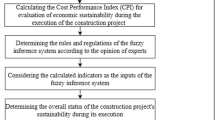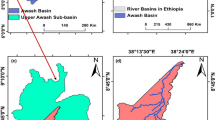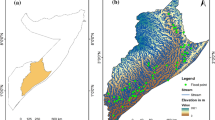Abstract
With the increasing development of economics in China, the performance evaluation and obstacle diagnosis for urban water ecological civilization construction (UWECC) have attracted more and more attention, this study analyzes the coupling relationship between social economy and urban water ecology by applying framework model of “Driving force-Pressure-State-Influence-Response-Management”, establishing the performance evaluation index system of UWECC. The group fuzzy analytic hierarchy process is developed to determine indicator weights and to find out the key influencing factors. A combination of fuzzy synthetic evaluation (FSE) and cloud model is introduced for measuring UWECC performance level. The integrated model includes two parts. One component is that fuzzy set theory is combined with evaluation methods, proposing a FSE method. The other part is that cloud model is utilized to make up for this limitation of ignoring the internal randomness and ambiguity for the FSE method. Subsequently, the UWECC of Shizuishan City in China is selected from 2010 to 2019 as a case study, the results show that its UWECC performance scores gradually increased in the past ten years, the growth speed of which can be divided into three development stages: bad and slow-growth (2010–2014), intermediate but slightly fast-growth (2015–2017) and good and fast-growth (2018–2019). Besides, through making sensitivity analysis of indicators to each subsystem, it is found that their sensitivities show obvious differences. In terms of the main obstacle indicators affecting UWECC performance, they also present obvious temporal heterogeneity characteristics, that is, the obstacle degrees of indicators in the same stage have slightly smaller differences, and those of indicators in different stages exist significant differences. The demonstration conducted proves that the proposed method can be used not only to accurately understand the changes of UWECC through time but also to diagnose the crucial obstacle indicators, providing theoretical basis for improving UWECC performance of this urban in the future.















Similar content being viewed by others
Data availability
The data used in this study is available from the corresponding author upon request.
Abbreviations
- WEC:
-
Water ecological civilization
- UWEC:
-
Urban water ecological civilization
- WECC:
-
Water ecological civilization construction
- UWECC:
-
Urban water ecological civilization construction
- AHP:
-
Analytic hierarchy process
- GFAHP:
-
Group fuzzy analytic hierarchy process
- FSE:
-
Fuzzy synthetic evaluation
- DPSIR:
-
Driving force-Pressure-State-Influence-Response
- DPSIRM:
-
Driving force-Pressure-State-Influence-Response-Management
- OECD:
-
Organization for Economic Cooperation and Development
- TFN:
-
Triangular fuzzy number
- CI :
-
The consistency index
- CR :
-
The consistency ratio
- \(E_{x}\) :
-
Expectation
- \(E_{n}\) :
-
Entropy
- \(H_{e}\) :
-
Hyper entropy
- IVTF:
-
Interval valued triangular fuzzy
- \(F_{j}\) :
-
Deviation degree of indicator \(j\)
- \(W_{j}\) :
-
Contribution degree of indicator \(j\)
- \(O_{j}\) :
-
Obstacle degree of indicator \(j\)
- \(d_{j}\) :
-
Standardized value of indicator \(j\)
References
Akbar D, Horen BV, Minnery J, Smith P (2007) Assessing the performance of urban water supply systems in providing potable water for the urban poor: the case of Dhaka, Bangladesh. Int Dev Plan Rev 29(3):299–319
Chao Z, Song X, Feng X (2018) Concept and connotation of water resources carrying capacity in water ecological civilization construction. IOP conference series: earth and environmental science, IOP Publishing
Chen P, Shi X (2022) Dynamic evaluation of China’s ecological civilization construction based on target correlation degree and coupling coordination degree. Environ Impact Assess Rev 93:106734
Chen D, Jin G, Zhang Q, Arowolo AO, Li Y (2016) Water ecological function zoning in Heihe River basin, Northwest China. Phys Chem Earth Parts a/b/c 96:74–83
Dong F, Pan Y, Zhang X, Sun Z (2020) How to Evaluate Provincial Ecological Civilization Construction? The Case of Jiangsu Province, China. Int J Environ Res Public Health 17(15):5334
Dong F, Zhang Y, Zhang X, Hu M, Gao Y, Zhu J (2021) Exploring ecological civilization performance and its determinants in emerging industrialized countries: a new evaluation system in the case of China. J Clean Prod 315:128051
Douglas I (2012) Urban ecology and urban ecosystems: understanding the links to human health and well-being. Curr Opin Environ Sustain 4(4):385–392
Frazier AE, Bryan BA, Buyantuev A, Chen L, Echeverria C, Jia P, Zhao S (2019) Ecological civilization: perspectives from landscape ecology and landscape sustainability science. Landsc Ecol 34:1–8
Grizzetti B, Lanzanova D, Liquete C, Reynaud A, Cardoso AC (2016) Assessing water ecosystem services for water resource management. Environ Sci Policy 61:194–203
Hansen MH, Li H, Svarverud R (2018) Ecological civilization: Interpreting the Chinese past, projecting the global future. Glob Environ Chang 53:195–203
Han H, Li H, Zhang K (2019) Urban water ecosystem health evaluation based on the improved fuzzy matter-element extension assessment model: case study from Zhengzhou City, China. Math Probl Eng 1–14
Hu AH, Hsu CW, Kuo TC, Wu WC (2009) Risk evaluation of green components to hazardous substance using FMEA and FAHP. Expert Syst Appl 36(3):7142–7147
Kwong CK, Bai H (2003) Determining the importance weights for the customer requirements in QFD using a fuzzy AHP with an extent analysis approach. Lie Trans 35(7):619–626
Leeuwen CJ, Frijns J, van Wezel A, van de Ven FH (2012) City blueprints: 24 indicators to assess the sustainability of the urban water cycle. Water Resour Manag 26(8):2177–2197
Li D, Meng H, Shi X (1995) Membership clouds and membership cloud generators. J Comput Res Dev 32(6):15–20
Li D, Liu C, Gan W (2009) A new cognitive model: cloud model. Int J Intell Syst 24(3):357–375
Li Y, Li H, Li D, Zhang Z, Feng Y (2020) Construction of rural water ecological civilization index system in China. Water Pract Technol 15(3):797–806
Liu H, Wang L (2018) Construction of urban water ecological civilization system. In: IOP Conference Series: Earth and Environmental Science, vol 170, no. 3. IOP Publishing, p 032111
Liu J, Mooney H, Hull V (2015) Systems integration for global sustainability. Science 347(6225):1258832
Liu M, Liu X, Yang Z (2016a) An integrated indicator on regional ecological civilization construction in China. Int J Sust Dev World 23(1):53–60
Liu Z, Chen J, Chen D, Zhang S, Li XC, Zhu Y, Li Y (2016b). Evaluation system of water ecological civilization of irrigation area in China. In: IOP Conference Series: Earth and Environmental Science, vol 39, no. 1. IOP Publishing, p 012054
Liu C, Feng B, Zhang Z, Huang J, Wu D (2017) Evaluation model of water ecological civilization based on pressure-state-response matter element model. Trans Chin Soc Agric Eng 33(16):1–7
Lu Y, Xu H, Wang Y, Yang Y (2017) Evaluation of water environmental carrying capacity of city in Huaihe River Basin based on the AHP method: a case in Huai’an City. Water Resour Ind 18:71–77
Marinelli M (2018) How to build a ‘Beautiful China’ in the Anthropocene. The political discourse and the intellectual debate on ecological civilization. J Chin Polit Sci 23(3):365–386
Meng F, Guo J, Guo Z, Lee JC, Liu G, Wang N (2021) Urban ecological transition: the practice of ecological civilization construction in China. Sci Total Environ 755:142633
Minatour Y, Bonakdari H, Aliakbarkhani ZS (2016) Extension of fuzzy Delphi AHP based on interval-valued fuzzy sets and its application in water resource rating problems. Water Resour Manag 30(9):3123–3141
Ministry of Water Resources of the People’s Republic of China (2020) Evaluation guide of water ecological civilization construction
Neumann LE, Moglia M, Cook S, Nguyen MN, Sharma AK, Nguyen TH, Nguyen BV (2014) Water use, sanitation and health in a fragmented urban water system: case study and household survey. Urban Water J 11(3):198–210
Nezarat H, Sereshki F, Ataei M (2015) Ranking of geological risks in mechanized tunneling by using Fuzzy Analytical Hierarchy Process (FAHP). Tunn Undergr Space Technol 50:358–364
Pan X (2018) Research on ecological civilization construction and environmental sustainable development in the new era. IOP Conference Series: Earth and Environmental Science, IOP Publishing
Priscoli JD (2000) Water and civilization: using history to reframe water policy debates and to build a new ecological realism. Water Policy 1(6):623–636
Pow CP (2018) Building a harmonious society through greening: ecological civilization and aesthetic governmentality in China. Ann Am Assoc Geogr 108(3):864–883
Raju PS, Lonial SC, Mangold WG (1995) Differential effects of subjective knowledge, objective knowledge, and usage experience on decision making: an exploratory investigation. J Consum Psychol 4(2):153–180
Ren JL, Li H, Wu XM, Li XS (2016) Assessment of 11 provincial capitals’ water ecological civilization of the Yangtze River economic belt on the principal component. Resour Environ Yangtze Basin 25(10):1537–1544
Ren P, Liu X, Liu J (2018) Research on construction of indicator system for evaluation of the ecological civilization education in Chinese universities. Cogn Syst Res 52:747–755
Rietveld LC, Siri JG, Chakravarty I, Arsénio AM, Biswas R, Chatterjee A (2016) Improving health in cities through systems approaches for urban water management. Environ Health 15(1):151–160
Saaty TL (1994) How to make a decision: the analytic hierarchy process. Interfaces 24(6):19–43. https://doi.org/10.1287/inte.24.6.19
Shen J, Lu H, Zhang Y, Song X, He L (2016) Vulnerability assessment of urban ecosystems driven by water resources, human health and atmospheric environment. J Hydrol 536:457–470
Tian M, Wang T, Yu S (2016) Study on the evaluation of water ecological civilization-a case of cities in the pearl river delta region of China. Int J Earth Sci Eng 9(4):1689–1694
Tian P, Wu H, Yang T, Jiang F, Zhang W, Zhu Z, Xu X (2021) Evaluation of urban water ecological civilization: a case study of three urban agglomerations in the Yangtze River Economic Belt, China. Ecol Indic 123:107351
Thapar SS, Sarangal H (2020) Quantifying reusability of software components using hybrid fuzzy analytical hierarchy process (FAHP)-Metrics approach. Appl Soft Comput 88:105997
Wan B, Bao X, Zhao J, Li A (2021) Establishment and application of performance evaluation and obstacle diagnosis model for regional water ecological civilization construction. Environ Sci 42(4):2089–2100
Wang T (2017) Study on evaluation system for water ecological civilization of cross-border river cities in China. Revista De La Facultad De Ingenieria 32(6):251–256
Wang X, Chen X (2019a) An evaluation index system of China’s development level of ecological civilization. Sustainability 11(8):2270
Wang X, Zang M (2019b) Evaluation on ecological civilization construction level in Guizhou based on intuitionistic fuzzy analytic hierarchy process. J Risk Anal Crisis Response 9(2):93–100
Wang Y, Feng Y, Zuo J, Rameezdeen R (2019) From “Traditional” to “Low carbon” urban land use: evaluation and obstacle analysis. Sustain Cities Soc 51:101722
Wang D, Li Y, Yang X, Zhang Z, Gao S, Zhou Q, Zhuo Y, Wen X, Guo Z (2021) Evaluating urban ecological civilization and its obstacle factors based on integrated model of PSR-EVW-TOPSIS: a case study of 13 cities in Jiangsu Province, China. Ecol Indic 133:108431
Wheeler BW, Lovell R, Higgins SL, White MP, Alcock I, Osborne NJ, Depledge MH (2015) Beyond greenspace: an ecological study of population general health and indicators of natural environment type and quality. Int J Health Geogr 14(1):1–17
Wu Y, Wang H, Wu F, Lu J (2017) Exploration on Chenzhou Model of Urban Construction of Water Ecological Civilization in Southern Hilly Regions. Journal of North China University of Water Resources and Electric Power (Natural Science Edition)
Yan Y, Wang C, Quan Y, Wu G, Zhao J (2018) Urban sustainable development efficiency towards the balance between nature and human well-being: connotation, measurement, and assessment. J Clean Prod 178:67–75
Yan L, Zhang X, Pan H, Wu J, Lin L, Zhang Y, Xu C, Xu M, Luo H (2021) Progress of Chinese ecological civilization construction and obstacles during 2003–2020: implications from one set of emergy-based indicator system. Ecol Indic 130:108112
Yang C, Li H (2011) Comparative analysis of domestic and international ecological civilization theory. Appl Mech Mater 71:2695–2698
Yang P, Sheng X, Zhao Y, Zhu L (2019) Evaluation of ecological civilization development in the post-Olympic times. Appl Ecol Environ Res 17:8513–8525
Yao L, Xu J, Zhang L, Pang Q, Zhang C (2019) Temporal-spatial decomposition computing of regional water intensity for Yangtze River Economic Zone in China based on LMDI model. Sustain Comput 21:119–128
Zadeh LA (1965) Fuzzy sets. Inf Control 8:338–353
Zhang X, Wang Y, Qi Y, Wu J, Liao W, Shui W, Qi H (2016) Evaluating the trends of China’s ecological civilization construction using a novel indicator system. J Clean Prod 133:910–923
Zhang X, Zhu J, Xie J, Liu J, Jiang R (2017) Selection of an evaluation index for water ecological civilizations of water-shortage cities based on the grey rough set. In: IOP Conference Series: Earth and Environmental Science. IOP Publishing
Zhang M, Liu Y, Wu J, Wang T (2018) Index system of urban resource and environment carrying capacity based on ecological civilization. Environ Impact Assess Rev 68:90–97
Zhang L, Xin H, Kan Z (2019) Sustainability performance evaluation of hybrid energy system using an improved fuzzy synthetic evaluation approach. Sustainability 11(5):1265
Zhao J, Jin J, Zhu J, Xu J, Hang Q, Chen Y, Han D (2016) Water resources risk assessment model based on the subjective and objective combination weighting methods. Water Resour Manag 30(9):3027–3042
Zhao Y, Sheng X, Yang P, Zhu L (2019) Evaluation of ecological civilization in megacities. Appl Ecol Environ Res 17(4):8527–8540
Zhi YL, Wang HM, Liu G (2015) Study of fuzzy evaluation method on ecological civilization construction based on grey interval number. Int J u-and e-Serv Sci Technol 2(8):263–280
Zuo Z, Guo H, Cheng J, Li Y (2021) How to achieve new progress in ecological civilization construction?–Based on cloud model and coupling coordination degree model. Ecol Indic 127:107789
Acknowledgements
This work received funding from National Natural Science Foundation of China (Nos. U1934216, 71871226, U1834209). Natural Science Foundation of Hunan province, China (No. 2018JJ3698).
Funding
The authors have not disclosed and funding.
Author information
Authors and Affiliations
Corresponding author
Ethics declarations
Conflict of interest
The authors declare no competing financial interest.
Additional information
Publisher's Note
Springer Nature remains neutral with regard to jurisdictional claims in published maps and institutional affiliations.
Supplementary Information
Below is the link to the electronic supplementary material.
Rights and permissions
About this article
Cite this article
Chai, N., Zhou, W. & Wan, B. Research on performance evaluation and obstacle diagnosis for urban water ecological civilization construction based on GFAHP-cloud-FSE model: the case of Shizuishan, China. Stoch Environ Res Risk Assess 36, 3439–3465 (2022). https://doi.org/10.1007/s00477-022-02203-4
Accepted:
Published:
Issue Date:
DOI: https://doi.org/10.1007/s00477-022-02203-4




